- Home
- W. Bruce Cameron
The Dog Master: A Novel of the First Dog Page 5
The Dog Master: A Novel of the First Dog Read online
Page 5
Silex’s father lay by the fire. He was stripped of all but a single fox fur tossed across his lap. His right leg was black at the ankle where he had snapped it in the rocks, and scarlet streaks tracked up the leg toward his groin. He was panting, his face dotted with perspiration.
“Father?”
For a moment Silex saw nothing but a wildness in his father’s eyes, and then the look focused. “Silex. You are back,” the older man greeted, his voice strained.
“I paid tribute. A she-wolf looked me right in the face, stared in my eyes. She was enormous, and had what appeared to be a human handprint on her forehead.”
The older man grunted. “Perhaps there is a message for me in that. I am afraid my fever will take me soon. I am cold and then hot.”
“You are sitting close to the fire. That might be why you are sweating.”
Silex had to glance away from his father’s angry glare. “It does not provide me any comfort to be lied to,” his father chided. “We both know what is happening.”
“Yes, Father.”
“I am glad you are back. I have asked Duro to gather everyone by the center fire. I will speak my wishes for the Wolfen, and my wishes will be obeyed.”
Silex briefly closed his eyes. “Of course,” he murmured, but he dreaded what was coming.
“Listen to me now. When I am gone, you will be the dominant male of the Wolfen. You will marry Ovi, the dominant female, and have my grandchildren. This is how it is done among the wolves—the superior mating pair produces the best offspring, whatever the families they come from. This means one of your sons, my grandson, will go on to lead from there.”
Silex drew in a breath. “Father. About Ovi. I … I love someone else, Father. Fia. I love Fia, and would marry her instead.”
His father struggled to a sitting position. “No, you will do what I say,” he said dismissively. “You are lucky to even have a wife. Though recent births have given us daughters, the long period where only boys survived childhood means we now have far more single men than women.” He gave Silex a contemplative look. “I should have anticipated the problem, but for so long I was only thinking how good it was to have so many hunters. Now this is something you will have to solve. You might want to consider raiding another clan and taking some females.”
Silex was shocked. “The Wolfen are not like the Cohort. We do not steal people.”
“Well. You may find your ideals do not suit the demands of leadership.” He motioned to Silex to help him walk, and Silex took his father’s weight on his shoulder as they limped down to where all the Wolfen adults were gathered by the fire. Silex glanced around for Fia, hoping to spot her, but he did not find her eyes. Instead, he saw Ovi, who stood gazing sadly into the flames.
“We are Wolfen,” Silex’s father began when he had everyone’s respectful attention. “We follow the ways of the wolf. We run when other creeds walk, so that no man can keep up with us. And we are led by a dominant male because that is what is best.” He coughed, looking dizzy, and Silex almost staggered with the change in weight. “My leg is turning to poison and I have a fever that will not pass. I will not live for many more days,” he continued. “When I am gone, my son Silex will be your leader.” He glared, waiting for an objection, but there was none. “And he will marry Ovi.”
Silex glanced over and met Ovi’s eyes. She was three years older, her body rounded and her face pretty, though it was grave now as she stared back at Silex.
“They will have strong children.” This last pronouncement seemed to take everything out of the old man, and he sagged against his son. If anyone was going to challenge these pronouncements, now would be the time, when their leader was faltering and weak.
No one said anything. No one defied him. Not any of the Wolfen men who might resent being led by a sixteen-year-old boy. Not Ovi, who probably had not known of the marriage plan until this moment. Not even Silex, who loved a girl named Fia but now, instead, was fated to marry Ovi.
Ovi, his sister.
SIX
Most little children of the Kindred were frightened of Albi. She was big boned for a woman and had the same odd pale-eyed coloring as her son Palloc, though Albi had lived for more than three tens’ worth of summers and had a weathered, blotchy face to show for it. She had stopped tying her hair back when her husband was killed by a mammoth, so it was a long, tangled mess. Once a lighter shade of brown, it was increasingly wispy with grey. It gave her a wild, nearly savage look.
Albi had recently taken to walking with a straight, stout tree branch, thumping it on the ground for emphasis when she was speaking. She had it with her now and was leaning on it, glaring at Calli and Urs with her strange eyes narrowed.
“You said ‘understand about Albi.’ Understand what?” Albi demanded to know.
Calli kept her feelings hidden but when she glanced at Urs everything was revealed on his face: their secret afternoon, their forbidden vows, their heretical ideas of marriage. “Urs feels your son is too bossy as spear master,” Calli blurted. Nothing less than a shameful admission would explain Urs’s guilty expression. “He wanted me to ask you to talk to Palloc about it, but I was saying you would never interfere with the hunt.”
Albi sneered. “That is right. Why do you run to me? Perhaps Palloc deals with you sternly because though you are offensively tall, inside you are a small, cowardly child.”
Urs’s lips twitched with his anger. Calli turned so that she faced him full on, her back to Albi. Her eyes pleaded with Urs even as she said, “So there is your answer. You should speak to Hardy the hunt master if you have issues with Palloc.”
Calli bit her lip, watching Urs struggle with the insult. Then he locked his eyes on hers and her heart filled with affection. He understood what she was doing. “I must go now and help prepare for the hunt,” he said stiffly.
“I suppose you should,” Albi responded mockingly. Calli sighed in silent relief when Urs turned away.
“Calli Umbra. That is not what you were talking about. You cannot fool me.”
“I do not know what you mean, Council Mother,” Calli responded lightly.
“You do not want to defy me, girl of mists and shadows.”
“I’m sorry, old woman whose colors are the palest shades of white,” Calli answered gravely, mocking Albi’s formal name. The two of them locked eyes, and it was Albi who looked away first.
* * *
Food was scarce for the Kindred that summer. In the days after Urs and Calli encountered the fleeing Wolfen, hunt master Hardy took the hunt out often, frustrating the couple’s plans to be together in their special place. Every moment he was gone, Calli felt as if her arms ached with a special, empty lack.
On this day, the hunt was back at camp, but were assembled on the men’s side of the settlement. Calli could see Urs’s back as he crouched in the circle with other men, and she stared at him, willing him to glance up at her and give her that shiver when their eyes met. But he did not.
Cook fires smoldered around the settlement, but nothing was cooking. When there was so little to eat, the Kindred pooled their meager resources, and it was up to Calli and Coco, Calli’s mother, to stretch their meals so that all might feed.
Coco had gone to dig for some tender roots to add to their meal. Into the hollow of an enormous log, Calli had poured water, added grass, and was now carefully shredding a small bird that had been roasted over the coals. Other than the bird, they had two recently skinned rabbits, and that was it—scarce protein for the entire Kindred, which at more than forty members was the largest of the northern creeds. Calli would strip the rabbit meat and then pound the bones to fragments and add them to the soup. The men of the hunt would feed first, of course, which meant the children and women would lie hungry in their sleep.
Renne came to the cooking fire, trailing four children who were all just a little over three years old. Calli noted that recently Renne had taken to wearing her hair braided like Calli’s, which was uncharacteristically bold for
her. Renne was a nineteen-year-old orphan and therefore answered to the women’s council, and many of the older members disapproved of the fancy braids. “What is Calli doing for the Kindred?” Renne asked.
“Cooking!” the children shouted in unison.
Renne and Calli exchanged a smile. Teaching the children was a task most of the women enjoyed, something they all shared. Renne, who was shorter than Calli despite being three years older, seemed especially to enjoy it.
“Now, who can show me their man’s side hand?” Renne asked the children.
There was some confusion, but Calli, standing behind Renne, raised her right hand and eventually all of the children were waving their right hands in the air. “All is good, that is correct,” Renne beamed. She pointed off to her right, where the single men slept beneath their tents of skin, and the hunters gathered around their fire to discuss important matters. “And that is the men’s side. Do children go to the men’s side?”
“No!” the children chorused without guile. They all knew they were not supposed to visit their fathers over there, but they would all do so until they were old enough to understand.
“Now show me the woman’s hand,” Renne instructed. Kidding, Calli held up her man’s hand and the children laughed at her as they wildly thrust their left hands into the air. “That is correct.” The women’s side was far more open—children ran in and out of the area. Only men were forbidden access.
Then Renne spread her arms to indicate the rest of the settlement. Behind her, a hill of rocks revealed some small caves, and in front of her, families had leaned skin-covered poles on boulders or had fashioned tents out of mammoth bones and animal hides. Unlike the relatively small men’s and women’s sides, the section in the middle, the communal area, spread from the hills to the stream. Anyone might wander in the communal area, though it was only polite to give family tents a buffer zone of privacy. “And this is for all the Kindred,” Renne pronounced. “From here to the stream. But should children ever try to cross the stream, take the stream path up water, from where the stream flows, or down water, to where it goes?”
“No,” the children ventured as one, but without the joyous enthusiasm. They knew why they should never enter those places: the Cohort was out there and would steal them away from their parents.
Renne and the children left just as Bellu joined Calli at the fire. “Is this it? Only two rabbits?” Bellu looked dubiously at the two small carcasses.
As fire maker for the Kindred, Bellu had probably the least arduous job of anyone—the communal fire burned perpetually, so that only when the tribe was on the move was there any actual “making.” She even had children assigned to fetch her kindling.
But, at age sixteen, Bellu was beautiful. Her legend told of a face so charming that grown men sang to her, and her formal name, “Her Face Brings Happiness to All with Its Beauty” was an apt appellation for a woman who had straight teeth, a face free of scars, flashing dark eyes, and symmetrical features. Her hair was thick and black and long, and she wore it free and flowing like a child. Like Calli, Bellu was eligible for marriage now—it was a topic they discussed frequently.
“I hope the hunt is successful,” Calli remarked. “Who is going?”
Bellu was an authority on the hunt because she had five brothers, but Calli already knew who was going; she just wanted Bellu to bring up Urs’s name.
Bellu was frowning, her pink tongue in the corner of her mouth as she concentrated on scooping up a hot rock from the center of the fire using two sticks. She looked up at the question and the rock rolled back. “Here comes Albi,” she hissed.
Calli bent over, concentrating on stirring dinner.
“So,” Albi pronounced, her bulky shadow falling over the younger women as she dipped a dirty finger into the soup. She tasted it and made a face. “You cannot feed the hunt with this! You need more grass. Go fetch some.”
Calli and Bellu looked at each other. “My mother went to get…”
“I do not care what your mother said, I am telling you this needs more grass.” Albi thumped her thick stick on the ground. “Are you arguing? No. Then go.”
They went. When Calli glanced back, Albi was standing with her arms folded, glaring at them.
“I am so sick of grass,” Bellu muttered. “Where are the reindeer? Why is hunting so bad this year?”
“Why does Albi want us to leave the fire?” Calli wondered out loud.
* * *
The day after being fed by the man, the large she-wolf and her two lanky male companions followed their noses back to the pack and were instantly beset upon by the four pups who had been born that past spring. Clumsy and playful, the young pups tripped over themselves as they rushed to greet the returning hunters. When the pups sat and licked at the large she-wolf’s mouth, she quietly regurgitated a meal for them, the taste reminding her of the human who had given her the meat. The males who had hunted and fed with her also obliged the wolf cubs. She watched approvingly as the little ones ate. She nosed the largest of the cubs, a male, and he responded with an uncoordinated lunge at her ears, pulling at her fur with his tiny teeth.
What she felt toward these pups, who were not hers, was not so much love, but a sense of prideful responsibility. The pack was strong, now. These new members added to that strength. They were healthy and were eating well. That was good.
She thought again of the source of the meat, the human. She had smelled the fear coming from him, but there had been something else underlying it, something oddly compelling. And his face: when it came to other species, wolves had no experience outside of prey and predator. Prey was always implacable—even a charging bull elk had cold, expressionless eyes behind his lowered antlers. Predators were more revealing, but wolves knew little from bear or lion other than aggression or fear. The human’s face, however, throbbed with his strong emotions and the she-wolf actually felt them, even though she didn’t understand them. When suddenly the meat came flying at them it carried, for the wolf, the same sense she had as when she just now brought up a meal for the pups. The human had been providing.
The mother of the pups, the pack’s dominant bitch, her teats now dry but still slightly distended, was approaching. The big she-wolf watched her, sensing an odd tension rippling through the wolves of the pack.
This was this particular wolf’s first litter. The large she-wolf thought of the dominant female as Smoke, an association not built of words but of smell and taste. When the she-wolf and her siblings, as puppies, had been fed a regurgitated meal a year ago by this dominant wolf, it carried with it a tinge of the smoke that sometimes floated on the air near where humans gathered. Smoke had obviously eaten something burned, because the smell lingered on her breath and oozed from the pads of her feet for many days.
Smoke’s approach alerted the rest of the pack because it was direct, her unwavering eyes focused on the large she-wolf, who knew she should grovel before the dominant bitch, but something stopped her. She held herself rigidly, tail slightly aloft, as Smoke sniffed her. She was risking punishment, but something compelled her not to yield. The rest of the pack grew even more agitated when Smoke put her head on the large she-wolf’s shoulder, an aggressive move just shy of an attack.
As if her youth and unreadiness suddenly occurred to her, the she-wolf cringed instead of continuing her insolence. She dropped her tail until the tip of it brushed her own stomach, she whimpered and blinked her eyes rapidly, she licked Smoke’s mouth.
Smoke’s low growl and unwinking stare was all the punishment the dominant bitch chose to administer, this time. But the she-wolf’s insulting lack of submission had been observed by all the wolves in the pack. Yes, she was young and inexperienced, but she was also huge, bigger than even the dominant male. She was healthy and strong.
A fight was coming, and the pack knew it.
SEVEN
Coco was waiting with her arms crossed for Calli and Bellu as the two young women returned with their arms full of new grass. “Wh
ere have you been?” she hissed furiously.
Coco was, in many ways, an older version of her daughter Calli. Both were slightly tall for women. Both had stocky legs and muscular buttocks, drawing men’s eyes when they wore their shorter summer garments. Neither had Bellu’s perfection, but they were still considered beautiful among the Kindred. Their eyes carried laughter more than fury, but not now: Bellu actually held back a few paces, cowed by the inexplicable rage on Coco’s face.
“We…” Calli looked to Bellu for support, then down at the grass in her arms.
“Look!” Coco commanded. She thrust a finger at the flat rock by the fire on which the skinned rabbits lay. Calli stared, then exchanged horrified glances with Bellu. Only one carcass remained.
Bellu scanned the sky for the bird that might have done this, but Calli knew no bird would come in so close to a smoking fire. This had been a human, who had done this. One of the Kindred.
“You can never leave food unguarded during times of great hunger!” Coco scolded.
Bellu made a small whimpering noise. She was unaccustomed to anyone being angry at her. Coco ignored her—she remained focused on Calli, waiting for an explanation.
But Calli was looking over her mother’s shoulder. Albi was approaching, leaning on her heavy stick.
“What is happening here?” Albi demanded.
Coco reluctantly explained that they were short a rabbit. Albi raised a furious finger and stabbed it at Calli. “You should have piled stones on the carcasses,” she raged. “Now we have even less to eat!”
Bellu looked close to tears, but Calli said nothing. She was staring at Albi, whose chin was shiny with a new, slick coat of grease.
* * *
Silex was at the front of a party of five other Wolfen hunters. They ran easily, keeping the wolves to their left, far enough away on the rolling plains that only their fur-covered backs were visible above the grasses, rippling like water flowing over rocks. The Wolfen hunters did not know where the pack was going, but the wolves ran in the single-file lope they usually employed when they were tracking game.

 Bailey's Story: A Dog's Purpose Novel
Bailey's Story: A Dog's Purpose Novel A Dog's Purpose
A Dog's Purpose Ellie's Story
Ellie's Story A Dog's Way Home
A Dog's Way Home Molly's Story
Molly's Story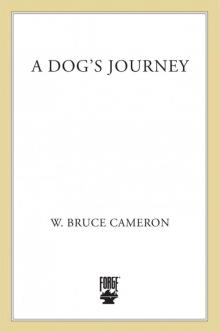 A Dog's Journey
A Dog's Journey The Dogs of Christmas
The Dogs of Christmas A Dog's Perfect Christmas
A Dog's Perfect Christmas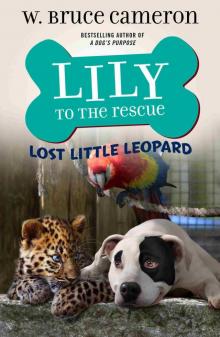 Lily to the Rescue: Lost Little Leopard
Lily to the Rescue: Lost Little Leopard Bella's Story
Bella's Story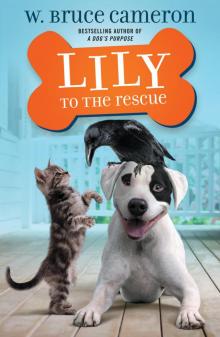 Lily to the Rescue
Lily to the Rescue Lily to the Rescue: The Not-So-Stinky Skunk
Lily to the Rescue: The Not-So-Stinky Skunk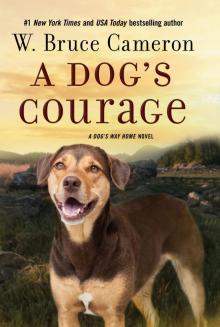 A Dog's Courage--A Dog's Way Home Novel
A Dog's Courage--A Dog's Way Home Novel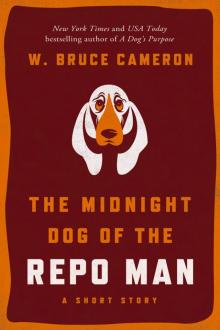 The Midnight Dog of the Repo Man
The Midnight Dog of the Repo Man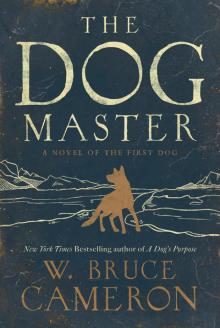 The Dog Master: A Novel of the First Dog
The Dog Master: A Novel of the First Dog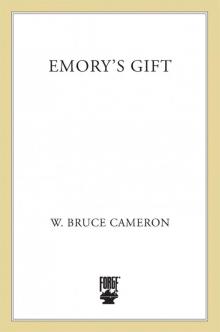 Emory's Gift
Emory's Gift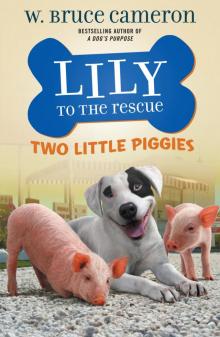 Lily to the Rescue: Two Little Piggies
Lily to the Rescue: Two Little Piggies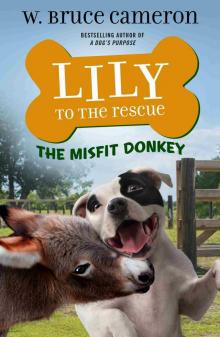 Lily to the Rescue: The Misfit Donkey
Lily to the Rescue: The Misfit Donkey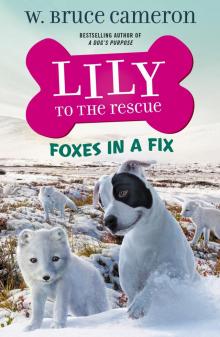 Lily to the Rescue: Foxes in a Fix
Lily to the Rescue: Foxes in a Fix Lily to the Rescue: Dog Dog Goose
Lily to the Rescue: Dog Dog Goose Max's Story
Max's Story A Dog's Purpose Boxed Set
A Dog's Purpose Boxed Set Toby's Story
Toby's Story Repo Madness
Repo Madness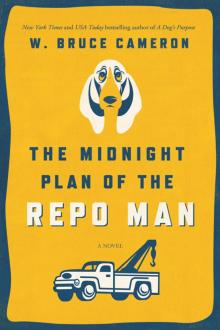 The Midnight Plan of the Repo Man
The Midnight Plan of the Repo Man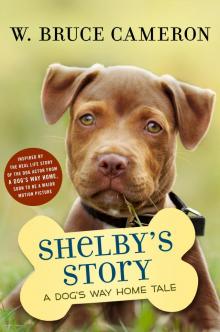 Shelby's Story
Shelby's Story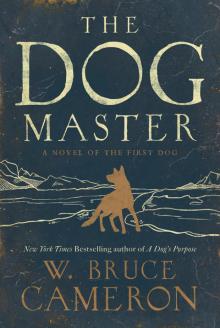 The Dog Master
The Dog Master Bailey's Story
Bailey's Story